Table of Contents
If you’re on the hunt for the perfect writing software to bring your novel to life, you’re not alone. Every novelist’s journey is packed with characters clamoring to tell their stories, plot twists itching to unfold, and, of course, the quest for the ideal software to weave it all together. Finding the right writing tool is like searching for a trustworthy companion for this adventure—one that understands your process, keeps up with your pace, and, most importantly, doesn’t let you down when the going gets tough.
So, how do you pick this perfect partner in storytelling from the sea of options available? Let’s break it down to some core criteria that might help you make that decision.
Criteria for Choosing the Best Writing Software:
- Ease of Use: You’re here to write a novel, not to wrestle with complicated software. The ideal writing tool feels intuitive right from the start, letting you dive straight into crafting your story without a steep learning curve.
- Flexibility and Organization: With characters developing, plots thickening, and settings expanding, you’ll want a software that keeps up with your evolving narrative. Look for tools that help you organize your thoughts, chapters, and notes in a way that makes sense to you.
- Collaboration Friendly: If your writing process involves sharing drafts with editors, co-writers, or beta readers, having built-in collaboration features can be a game-changer. Real-time editing, commenting, and feedback collection can streamline the revision process significantly.
- Cross-Platform Compatibility: Whether you’re a laptop loyalist, a desktop devotee, or someone who likes to scribble ideas on a tablet or phone on the go, ensuring your writing software works across all your devices is key to a seamless writing experience.
- Cost-Effective: While investing in your writing career is important, you don’t necessarily need to break the bank to get quality software. Assess your budget and explore the range of free and paid options to find one that offers the best value for your needs.
- Distraction-Free Environment: Sometimes, the biggest challenge is simply keeping focused. A writing environment that minimizes distractions can help you stay on track and boost your productivity.
- Extra Features for Creativity: From storyboarding tools to character development questionnaires, some writing software comes with added features designed to spark your creativity and help flesh out your novel’s world.
For Drafting and Organizing
Automateed
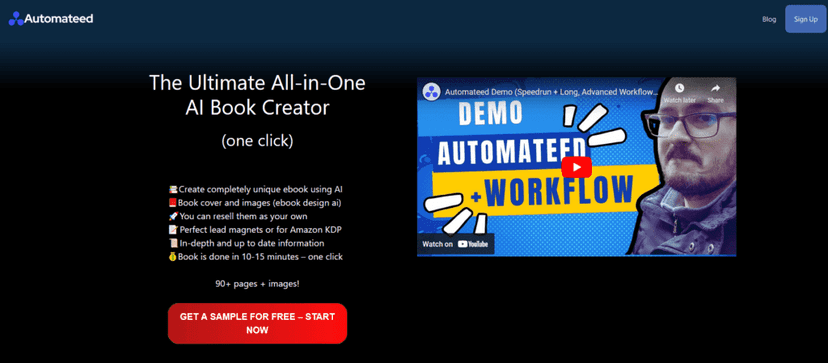
AI Automateed is an AI tool that writes both non-fiction and fiction books for you in one click. All you have to do is provide the tool with the title, your target audience, and tone of voice/style of writing, and it will generate an outline with 15 chapters, 3 subchapters each. Then, you can edit the outline or just start the tool. It’s so simple, that you don’t even need a PC.
It will then create a book of approximatelly 90 pages, with table of content, all chapters, images, cover for the book, all 100% unique, original, yours and ready to sell. If you are not sur ewhat it is that you want to write about, the tool has options to give you niche ideas, then title ideas, and even create campaigns for marketing on social media, etc.
Pros
- Streamlined Process: AI Automateed offers a seamless experience from concept to completion. By simply inputting your desired title, target audience, and writing style, you get a comprehensive outline that jumpstarts your book project.
- Efficiency: The promise of generating a 90-page book with a table of contents, chapters, images, and even a cover, all in one click, speaks volumes about the tool’s efficiency. This could significantly reduce the time it takes to go from an idea to a finished product.
- Customization and Originality: The tool assures that the content created is 100% unique and original, which is crucial for writers concerned about authenticity. Plus, the ability to edit the outline allows for a personalized touch, ensuring the final book aligns with the author’s vision.
- Support Beyond Writing: Providing niche and title ideas can be immensely helpful for writers unsure of where to start. Moreover, the tool’s ability to create marketing campaigns for social media adds value by addressing the promotional aspect of book publishing.
Cons
- Lack of Human Touch: While AI technology can produce content efficiently, it may lack the nuanced understanding and emotional depth that human writers bring to their work. This might be particularly noticeable in fiction, where character development and emotional resonance are key.
Scrivener
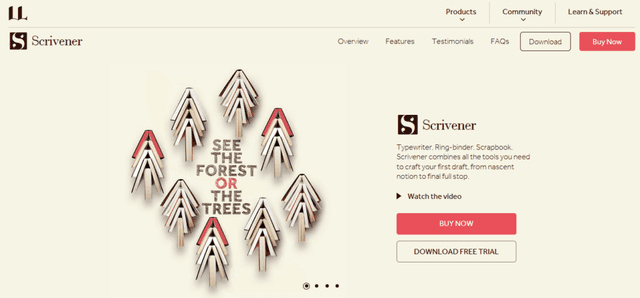
Imagine having a tool that not only lets you write but also organize your thoughts, research, and plot points all in one place. That’s Scrivener for you. It’s the writer’s workshop, designed to support you from that first spark of inspiration to the final draft. Scrivener shines when it comes to organizing complex projects. It allows you to break down your manuscript into manageable chunks, reorganize sections with ease, and keep all your research and notes within arm’s reach. It’s a sanctuary for writers who love to plan every detail.
Pros: Scrivener’s corkboard and outlining tools are a game-changer for visualizing and structuring your narrative. The software is customizable, letting you create a workspace that fits your writing style. When you’re ready, compiling your work for different formats is straightforward, making it easier to take your draft to the publishing stage.
Cons: However, with great features comes a somewhat steep learning curve. Some writers might find its multitude of options overwhelming at first glance. Plus, Scrivener is not free, which might be a consideration for those on a tight budget.
Google Docs
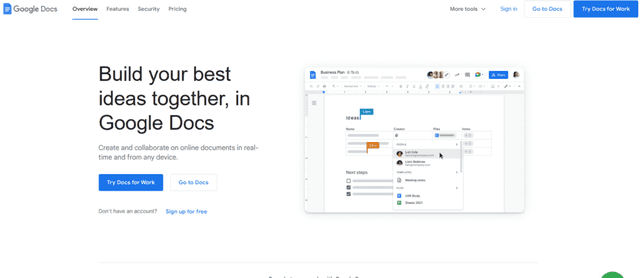
On the other end of the spectrum, Google Docs offers simplicity and ease of use. It’s the go-to for writers who prioritize accessibility and collaboration over complex organizing tools. Being cloud-based means you can access your manuscript from anywhere, on any device, without fear of losing your precious words to a computer crash. The real-time collaboration feature is a blessing for writers working with editors, co-writers, or anyone else who needs to peek into your work.
Pros: Google Docs is incredibly user-friendly and requires virtually no time to learn. It’s also free, which is perfect for writers just starting or anyone looking to minimize costs. The collaboration tools are some of the best in the business, making it easy to receive feedback and make edits on the fly.
Cons: Where Google Docs falls short is in its lack of advanced features for novel writing. Organizing a lengthy manuscript can get cumbersome, and the formatting options are limited compared to more specialized writing software. Plus, you’re reliant on having an internet connection, which might not always be convenient.
Evernote
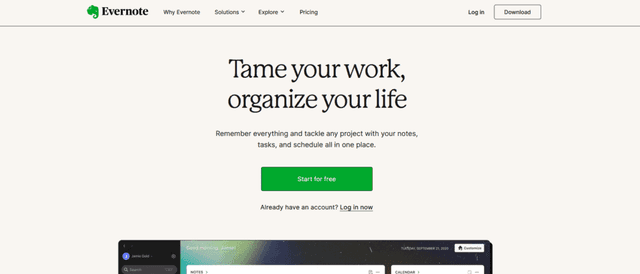
Think of Evernote as the ultimate digital notebook. It’s where you can throw in all your ideas, research, snippets of dialogue, and character sketches without worrying about organization—at first. Evernote excels in helping you keep track of everything that goes into planning and writing your novel. It’s more than just a writing tool; it’s a repository for everything that feeds into your writing process.
Pros: The ability to sync your notes across devices means you can jot down ideas on your phone and expand on them later on your computer. The organizational system—using notebooks, tags, and a powerful search function—makes retrieving your information easy and fast.
Cons: Evernote is not designed for writing and formatting a manuscript. It’s excellent for planning and note-taking but falls short when it comes to the actual writing process. Additionally, while there is a free version, serious users will likely need the premium version to bypass limitations on uploads and device syncing.
For Focus and Productivity
FocusWriter
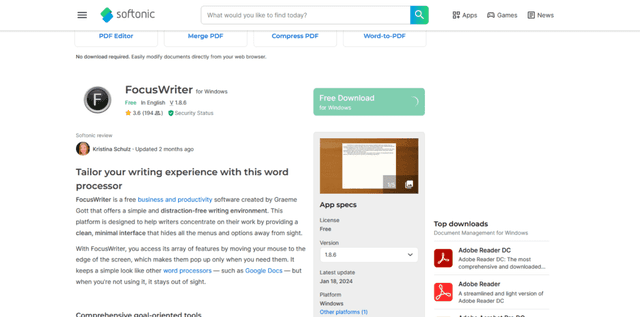
FocusWriter strips everything back to basics, offering a distraction-free environment for writers who need to concentrate on the words in front of them. It’s a straightforward tool that eliminates all the bells and whistles, providing a clean canvas for your creativity. Customizable themes and the ability to set daily goals and timers can help keep you motivated and on track.
Pros: It’s perfect for writers who find themselves easily distracted and is entirely free to use. The customizable backgrounds and themes allow you to create a writing environment that’s as minimalist or as personalized as you like.
Cons: The simplicity of FocusWriter is both its strength and its weakness. It offers very little beyond a space to type, lacking the organizational and formatting tools that come with more comprehensive software. There are also no collaboration features, which means sharing your work involves exporting it to another format first.
Each tool offers something unique, from Scrivener’s comprehensive organizational system to Google Docs’ unparalleled accessibility, Evernote’s exceptional note-taking capabilities, and FocusWriter’s simplicity. Your choice depends on what aspect of your writing process you value most.
Freedom
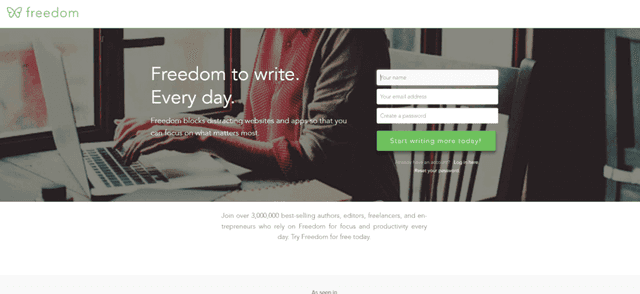
When you’re in the zone, the last thing you need is the siren call of social media or the latest news pulling you away from your narrative. That’s where Freedom steps in—a digital gatekeeper for your focus. It allows you to block distracting websites and apps across all your devices, creating a focused environment that encourages deeper concentration and productivity. Whether it’s social media, email, or your favorite news site, Freedom helps keep your attention where it belongs: on your writing.
Pros: The ability to customize which distractions to block and when can be a game-changer for writers prone to procrastination. It’s versatile, working across various devices, ensuring a unified distraction-free zone no matter where you choose to write.
Cons: There’s a cost to Freedom, which might deter some, especially those on a tight budget. Plus, the discipline to not circumvent the blocks you’ve set up is still required. It’s a tool, not a magic solution, and its effectiveness relies on your commitment to stay focused.
For Brainstorming and Planning
Milanote
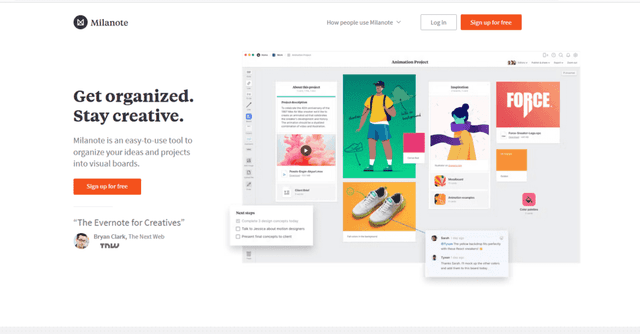
For the visually inclined writer, Milanote offers a canvas to paint your ideas, plot lines, and character sketches in a visually engaging way. It’s like a digital whiteboard, providing a flexible and dynamic space for brainstorming and planning your novel. You can create boards for different aspects of your story, from character development to setting descriptions, and connect these elements visually to see how they interrelate. It’s an invaluable tool during the early, often messy stages of crafting your story.
Pros: Milanote’s visual approach to organization can help unlock new insights and connections within your story that a traditional text document might not reveal. Its interface is intuitive and designed for creative workflows, making it easy to get started and maintain momentum.
Cons: The free version of Milanote has limitations, such as the number of notes you can add, which might restrict its usefulness for larger projects. Additionally, while its visual nature is a strength, writers who prefer a more text-focused, linear approach to planning might find it less suitable.
For Formatting and Publishing
Vellum
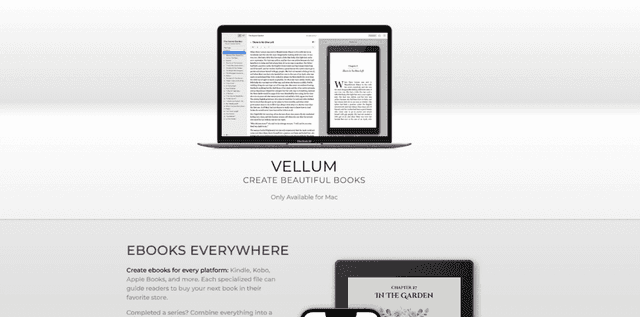
When it’s time to turn your manuscript into a book, Vellum steps up to the plate. It’s specifically designed to simplify the process of formatting your book for publication, supporting both eBooks and print formats. Vellum’s strength lies in its ability to produce professional-looking layouts with minimal effort, offering various styling options to choose from. It’s about making your book not just readable, but visually appealing to your readers.
Pros: Vellum is incredibly user-friendly, requiring no prior formatting knowledge to get started. The preview feature allows you to see exactly how your book will look on different devices, ensuring your formatting looks great everywhere.
Cons: The main drawback of Vellum is its cost, particularly since it’s available only for Mac users, which limits accessibility for those on other platforms. Additionally, while Vellum offers beautiful formatting options, those seeking highly customized or unique layouts might find its options somewhat restrictive.
Additional Tools and Resources
Beyond specific writing and formatting software, there are numerous tools and resources available to support various aspects of the writing process:
- Grammar Checkers: Tools like Grammarly and ProWritingAid not only correct spelling and grammar but also offer suggestions to improve clarity and style, making them invaluable during the editing phase.
- Online Writing Courses: Platforms like Coursera, MasterClass, and Udemy offer courses on everything from creative writing fundamentals to the intricacies of publishing, taught by experienced authors and industry professionals.
- Writing Communities: Joining a writing community, such as NaNoWriMo or critique groups on platforms like Scribophile, can provide motivation, accountability, and valuable feedback on your work.
Wrap up
Writing a novel is a bit like going on an epic adventure—you’ll face dragons (writer’s block), you’ll find treasures (those perfect, flowing paragraphs), and you’ll make allies along the way (these wonderful tools we’ve talked about). Whether you’re scribbling down your first draft in Scrivener, keeping your focus with Freedom, sketching out your characters and plots in Milanote, or polishing your manuscript in Vellum, each tool brings something special to your journey.
But remember, tools are just that—tools. They’re here to support you, not to do the work for you. The real magic happens when you sit down, day after day, and pour your heart onto the page. So go ahead, experiment with these digital allies, find the ones that fit like a glove, and let them help you bring your story to life. After all, the world needs your novel, and there’s no better time to start than now. Here’s to your success, one word at a time. Cheers to the stories you’re about to tell!



